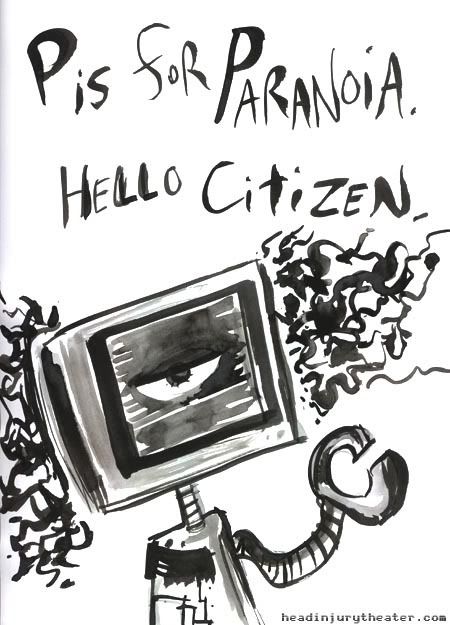
Someone has developed a cool new technology that allows you to imprint images on fabrics or other surfaces that only show up on digital cameras.
It is just a matter of time before someone figures out a way to completely abuse this.
(Props to Rob Berry for forwarding me this link)
Sunday, September 30, 2007
Unstructured Invisibility
Labels: Camera, Cool, Invisible, technology
Saturday, September 29, 2007
Friday, September 28, 2007
The Fermi Paradox: Further Reading
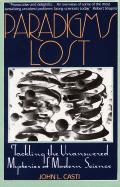 There are a lot of good books dealing, in whole or part, with
There are a lot of good books dealing, in whole or part, with
the overall subject of the search for extraterrestrial
intelligence (the very acronym of SETI) and speculations on
possibilities of success or failure. As such, this particular
listing is merely a sub-sampling of the books that are available
and should not be treated as anything close to a complete listing
of works.
- Extraterrestrials: Where are They?, by Ben Zuckerman (editor) and Michael H. Hart (editor)
- Alien Life: The Search for Extraterrestrials and Beyond,
by Barry R. Parker - SETI Pioneers, by David W. Swift
- Paradigm's Lost, by John L. Casti
 Perhaps the most controversial of all the proposed solutions
Perhaps the most controversial of all the proposed solutionsto the Fermi Paradox, this hypothesis has generated enough books,
pro and con, to fill several libraries. As such, any sampling of
books is going to be, by necessity, a non-representative sample.
That said, on the pro side, one can find such books as:
- The Day after Roswell, by Philip J. Corso
- Communion, A True Story, by Whitley Streiber
- Alien Contact: Top Secret UFO Files Revealed, by Timothy Good
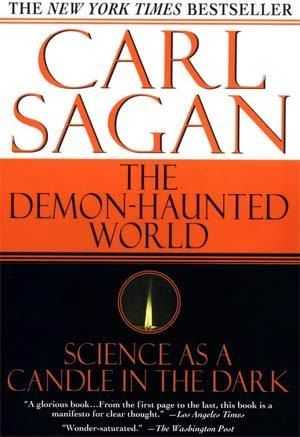 On the Con side, one can find such books as:
On the Con side, one can find such books as:- The Demon Haunted World, by Carl Sagan
- Why People Believe Weird Things, by Michael Shermer
- Scams from the Great Beyond, by Peter Huston
 This particular hypothesis is found, as a reoccurring theme, in much of Carl Sagan's works. Perhaps the best (cautionary) example can be found in Cosmos.
This particular hypothesis is found, as a reoccurring theme, in much of Carl Sagan's works. Perhaps the best (cautionary) example can be found in Cosmos.Isaac Asimov also dealt with the theme of world-threatening futures in A Choice of Catastrophes : The Disasters That Threaten Our World. Unfortunately, this book is hard to find, but well worth reading if you can find a copy.
The Chariots of the Gods Hypothesis
Like the Aliens are Among us Hypothesis, this hypothesis has been a source of extreme controversy ever since Erich von Daniken published the eponymous Chariots of the Gods. He has since expanded upon the original theme in The Eyes of the Sphinx : The Newest Evidence of Extraterrestrial Contact in Ancient Egypt.
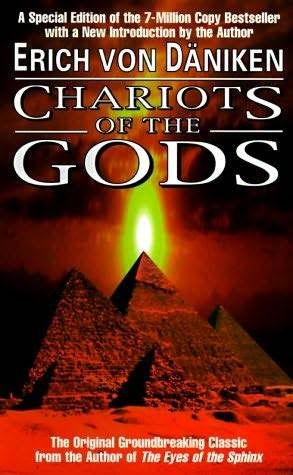 Rebuttals to von Daniken's theories can be found in such works
Rebuttals to von Daniken's theories can be found in such worksas Crash Go the Chariots, by Clifford Wilson, and The Space-Gods Revealed : A Close Look at the Theories of Erich Von Daniken by Ronald Story, both of which are somewhat hard to come by. PBS's Nova science series also did a critical report on von Daniken's theories in the 5th season episode The Case of the Ancient Astronauts. Unfortunately, this video is not available for sale from their online store, but a transcript of it can be ordered, for a nominal fee, from WGBH Audience and Member Services at (617) 492-2777, Ext. 5400.
The Dangerous Neighbors Hypothesis
 Charles Pellegrino is the primary architect of the DNH. In his opinion, the potential development of relativistic missiles using antimatter drives makes this a very real possibility. He deals with these themes extensively (and technically) in his two works of fiction, Flying to Valhalla and The Killing Star, which are both, unfortunately, currently out of print. Greg Bear also offers a fictional overview of this perspective, using even more esoteric technologies, in The Forge of God and Anvil of Stars.
Charles Pellegrino is the primary architect of the DNH. In his opinion, the potential development of relativistic missiles using antimatter drives makes this a very real possibility. He deals with these themes extensively (and technically) in his two works of fiction, Flying to Valhalla and The Killing Star, which are both, unfortunately, currently out of print. Greg Bear also offers a fictional overview of this perspective, using even more esoteric technologies, in The Forge of God and Anvil of Stars.The First Come, First Serve Hypothesis
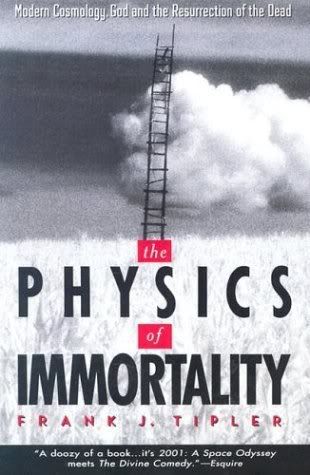 This particular hypothesis has received a lot of popularity in recent years, but it remains the brain child of Frank Tippler who first formulated it as part of his eschatological Omega Point Hypothesis in The Physics of Immortality.
This particular hypothesis has received a lot of popularity in recent years, but it remains the brain child of Frank Tippler who first formulated it as part of his eschatological Omega Point Hypothesis in The Physics of Immortality.A discussion of the Anthropic Principle, which is a major component of the First Come, First Serve hypothesis, can also be found in The Anthropic Cosmological Principle by John D. Barrow and Frank Tippler. A more technical (and expensive) treatment of the Anthropic Principle can be found in The Anthropic Principle : Proceedings of the Second Venice Conference on Cosmology and Philosophy.
The Stay at Home Hypothesis III (a.k.a., The Lotus Eater Hypothesis)
Although this particular example doesn't use virtual reality per our conventional understanding, Greg Bear's Blood Music offers, perhaps, the best fictional treatment of this particular hypothesis. While this title is out of print, I've found that most used book resources have available copies of it.
The Transcendent Hypothesis
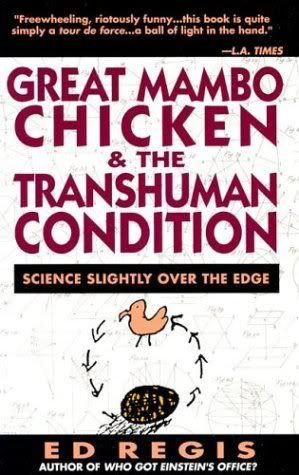 The concept of the Singularity is very popular in the Extropian movement, although not all Extropians agree with this particular interpretation of the singularity. For a good overview of transhumanism (which is a superset of the Extropian movement), I would recommend Great Mambo Chicken and the Transhuman Condition : Science Slightly over the Edge, by Ed Regis, as well as The Extropian Home Page.
The concept of the Singularity is very popular in the Extropian movement, although not all Extropians agree with this particular interpretation of the singularity. For a good overview of transhumanism (which is a superset of the Extropian movement), I would recommend Great Mambo Chicken and the Transhuman Condition : Science Slightly over the Edge, by Ed Regis, as well as The Extropian Home Page.The science fiction writer Vernor Vinge has been the primary advocate of the idea of the technological singularity as transcendent event. This idea was a central plot point in his novel Marooned in Real Time which is, unfortunately, currently out of print but, again, well worth searching for. Critiques of Vinge's concept of the Singularity can be found here.
Labels: fermi paradox
Thursday, September 27, 2007
Your Exceedingly Geeky Joke of the Interval
How many Lojbanists does it take to change a broken light bulb?
Two. One to decide what to change it into and another to find a bulb that emits broken light.
Extra geek cred to the first person to get the joke.
Super-extra geek cred to the first person to translate the joke into Lojban.
Science Tattoos

It would seem that even scientists aren't above putting a little ink in their skin. Carl Zimmer, who is the owner of The Loom science blog (as well as the author of several very good pop-sci books), asked if any scientists, in his audience, had tattoos. The response was so overwhelming that he created this very cool Flikr collection of the tattoos.
Wednesday, September 26, 2007
Unstructured Space Dive

What you see here is an artists conception of an experimental emergency reentry suit, that's actually on the drawing boards, which is supposed to give astronauts a last ditch option for returning to earth if their vehicle is incapacitated. The idea is that they literally do a high dive from orbit into atmosphere.
If Richard Branson is really serious about promoting space tourism, he ought to market this as the next extreme sport.
Labels: Cool, Extreme Sports, space
Tuesday, September 25, 2007
The Fermi Paradox: Conclusion
Ever since our species came to realize that other species could be out there, we have had a driving curiosity to know whether they are out there. An initial sense of optimism, where many people thought that our own solar system would be full of intelligent life, has crashed into the real world. The solar system not only lacks intelligent life, but it seems to lack any life other than our own, potential Martian fossils and speculations for life in the Europan ocean notwithstanding. SETI, likewise, has failed to turn up a single unambiguous signal from the stars. Many people are still optimistic that other intelligences may exist that are able and willing to communicate with us, but against the very real silence and emptiness that we have encountered, Fermi's profoundly simple question has become a very pertinent one to those holding such hopes. The fact that it may only be possible to gain a definitive answer to the question by actually going out into the galaxy and making a comprehensive search hasn't prevented us from suggesting answers. Indeed, as such proposed solutions to the Dangerous Neighbors, the Apocalyptic, and the Lotus Eater Hypotheses show, such speculations may be pertinent not only to our curiosity but to our future as a species.
Many people are still optimistic that other intelligences may exist that are able and willing to communicate with us, but against the very real silence and emptiness that we have encountered, Fermi's profoundly simple question has become a very pertinent one to those holding such hopes. The fact that it may only be possible to gain a definitive answer to the question by actually going out into the galaxy and making a comprehensive search hasn't prevented us from suggesting answers. Indeed, as such proposed solutions to the Dangerous Neighbors, the Apocalyptic, and the Lotus Eater Hypotheses show, such speculations may be pertinent not only to our curiosity but to our future as a species.
So we wait, and we ponder, and we listen with keen ears for the faintest indication that we may not be alone in the universe. As Carl Sagan stated on numerous occasions, any answer to that question is one that is well worth knowing.
Labels: fermi paradox
Monday, September 24, 2007
Intermission

The papers had no words today,
And the news was done in mime.
All the squires sang in silence,
While the thirteenth hour chimed.
The knights went off to Nowhere
To explore that distant land.
Everyone was much impressed
When they returned with empty hands.
We distilled all the whispers
Into a drink and drank
A silent toast in honor of
The artist that drew a blank.
If the papers have words tomorrow,
I wonder what they'll say
About all the many things
That were never done today.
Intermission photo courtesy of "alumroot"
Labels: Poem
Sunday, September 23, 2007
The Fermi Paradox: The Transcendent Hypothesis
 The Transcendent Hypothesis argues that technological development is exponential and that such development eventually leads to a period of asymptotic development with culminates with a technological "Singularity" at the asymptote. The TH suggests that when a species reaches this singularity, it "transcends", meaning that it either moves to another plane of being inaccessible to us (e.g., to another dimension), or that it becomes something so utterly alien that pre-singularity cultures are incapable of recognize it, much less comprehending it.
The Transcendent Hypothesis argues that technological development is exponential and that such development eventually leads to a period of asymptotic development with culminates with a technological "Singularity" at the asymptote. The TH suggests that when a species reaches this singularity, it "transcends", meaning that it either moves to another plane of being inaccessible to us (e.g., to another dimension), or that it becomes something so utterly alien that pre-singularity cultures are incapable of recognize it, much less comprehending it.
Critics of the TH complain that it is so utterly speculative as to be worthless. Even if we grant the notion that civilizations eventually reach some sort of technological singularity, the notion that they "transcend" is spiritual mumbo-jumbo thinly disguised by a science-fictional gloss. Lacking an actual mechanism to support the notion that civilizations can "transcend", it ought to be dismissed out of hand. Supporters of the TH contend that the notion of a singularity is firmly ground in real-world extrapolation and that the notion of transcendence is nothing more than a restatement of Clarke's Third Law, "Any sufficiently advanced technology is indistinguishable from magic". As such, any attempt to deal with the Fermi Paradox from a level of our own technological development is simply naive and we should expect advanced civilizations to be fundamentally incomprehensible.
Labels: fermi paradox
Saturday, September 22, 2007
The Hyphen Goes Through a Bad Period
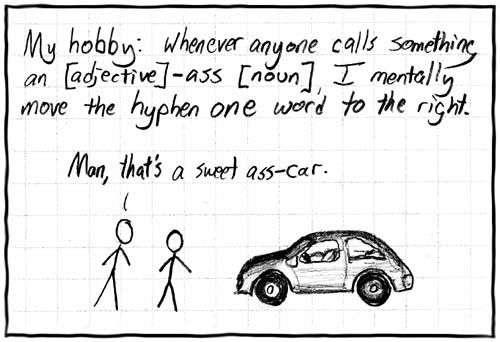
This just in: the short version of the Oxford English Dictionary is dropping the hyphen from some 16,000 compound words due to a number of factors, not least of which is the influence of the internet on written communication ("oh noes!") but also because people find them to be confusing and designers aren't fond of them either.
Fortunately, there's still a place for some hyphenation in those cases where the lack would generate an ambiguous construct (the article notes that there is a difference between a party that has twenty-odd people and a party that has twenty odd people -- namely that I'm much more likely to be attending the latter).
Comic courtesy of XKCD; used without permission
Labels: English, Hyphenation, language
The Fermi Paradox: The Stay at Home Hypothesis III (a.k.a., The Lotus Eater Hypothesis)
 The third SAHH suggests that, as species discover and develop virtual reality simulations, they eventually become so immersed in the simulations that they lose all interest in the external world. In such a scenario, the period between the development of radio communications and the rudiments of space travel, and the development of addictively immersive virtual realities is so short as to preclude the development of interstellar travel. Likewise, the potential period of communication would be so short as to make it unlikely that we would intercept a communication from another species before they turned permanently inward.
The third SAHH suggests that, as species discover and develop virtual reality simulations, they eventually become so immersed in the simulations that they lose all interest in the external world. In such a scenario, the period between the development of radio communications and the rudiments of space travel, and the development of addictively immersive virtual realities is so short as to preclude the development of interstellar travel. Likewise, the potential period of communication would be so short as to make it unlikely that we would intercept a communication from another species before they turned permanently inward.
Critics argue that it is unjustifiably pessimistic to suppose that any species would choose to live in simulated worlds to the exclusion of the real world and that, even if we suppose that some might, it's unreasonable to suppose that all species would be so prone. Supporters of the third SAHH counter that it is reasonable to presume that all species are subject to pleasure and pain stimuli. Furthermore, they insist that it is equally reasonable to suppose that a world tailored to species' preferences is going to be far more capable of stimulating the pleasure of that species than the mundane universe. As such, permanent virtual addiction seems inevitable for all but those few species that eschew virtual reality at a very early stage in its development. They note that our own species seems to be tumbling down that path without any sign of slowing.
Labels: fermi paradox
Friday, September 21, 2007
The Violence inherent in the System
Controversial events are much more enjoyable when passed through the lens of a Monty Python skit.
Labels: Controversy, Monty Python, video
The Fermi Paradox: The Stay at Home Hypothesis II (a.k.a., The Economic Impasse Hypothesis)
 The second SAHH suggests that the technological factors that restrict interstellar travel and communication, (e.g., the speed of light, interstellar dust, and so forth) simply make in uneconomical for any species to invest in such activities on any but the smallest scale (e.g., probes to local solar systems and broadcasts only to the very nearest set of stars). As such, intelligent life may be common in our galaxy, but travel and communication would be so restricted that we should never expect to encounter any evidence of it.
The second SAHH suggests that the technological factors that restrict interstellar travel and communication, (e.g., the speed of light, interstellar dust, and so forth) simply make in uneconomical for any species to invest in such activities on any but the smallest scale (e.g., probes to local solar systems and broadcasts only to the very nearest set of stars). As such, intelligent life may be common in our galaxy, but travel and communication would be so restricted that we should never expect to encounter any evidence of it.
Critics of the second SAHH argue that this hypothesis presumes that current limitations on technology can reliably be imagined to apply to future technologies. Proponents of the second SAHH counter that neither can one simply presume that a sufficiently advanced technology will be able to circumvent the known laws of physics.
Critics also complain that applying economic principles to extraterrestrial intelligences is patently anthropomorphic. Supporters of the second SAHH reply that economics isn't merely a human convention, but a universal description of how limitations on resources have an impact on actions. They point out, for instance, that many of the principles of economics apply directly to the evolution of biological systems.
Labels: fermi paradox
Thursday, September 20, 2007
Unstructured Pharyngea
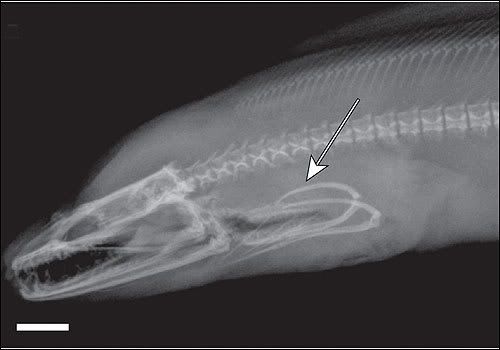
One of the freakier things about H.R. Giger's design of the Alien (from the movie of the same name) was that weird set of inner jaws that the alien had which would snap out at you when it got close.
The technical term for these sorts of second jaws are pharyngeal jaws. Such jaws actually do exist in nature, but, before now, no one had observed a set of pharyngeal jaws that could actually move independently of the outer jaw (they tend to be more like a second row of teeth). Recently, however, scientists have discovered that moray eels actually do have a pharyngeal set that do work something like the one's that the Alien has.
Let us hope that the rest of Geiger's more creative speculations remain in the realm of fiction.
Thanks to Arturo Magidin for pointing me to the NPR link
Labels: biology, Eels, marine biology, Science, weird
Unstructured Flow
Be sure to watch this one all the way to the end.
Labels: Cool, Fluid Dynamics, Science
Wednesday, September 19, 2007
Encounters with God... by way of Pirates
In honor of International Talk Like a Pirate Day, here's a Best of the Blog repete that I've put through a Pirate Talk filter. Arrr.
Atheists in this here country (by which I mean the United States o' America) ha' a common tendency ta exaggerate their plight. That be handsome Pete! He dances fer nickels! this here be not ta say that tharr arrn't no atheists, here, who ha' suffered discrimination in the workplace er before the law, nor be it ta claim we be never the recipients o' threats 'n' even violence. Avast me hearty mateys! It is, however, ta say that these be not the norm. Certainly, in comparrison ta such groups as homosexuals, our lot be not so mangy.
In me own experiences, the very worst thin' that has happened ta me as a consequence o' me atheism was a single death threat. Blow the man down. This here sounds dramatic but it was the sort o' anonymous threat that tends ta bubble out o' the cesspool that be Usenet and, while I did forwarrd it ta the proper authorities, I did not feel no great distress. ARR! I ha' certainly never suffered no actual violence due ta me atheism 'n' the only times I ha' felt compelled ta conceal it was not fer concern fer me safety but rather fer fearr that I'd needs be engage in some awkwarrd discussions with swabs whom I had no interest in debating.
Rather than sayin' that American atheists be a persecuted minority, I would say that we arre, in fact, an irritated minority. It be important ta understand, however, that the amount o' irritation that we receive be not negligible. Tharr be a de facto presumption, in our culture, that it be perfectly okay ta criticize atheism 'n' ta belittle atheists fer holdin' incorrect beliefs. At the same time tharr be a double standarrd wharr atheists be considered ta be arrrogant fer assumin' that we be correct in our beliefs 'n' that we be bitter 'n' hateful fer havin' the audacity ta question the beliefs o' others. In parrticularr, it be inevitable that if one admits ta atheism it be only a short amount o' time before someone comes along ta challenge that admission with a set o' arrguments that we ha' hearrd innumerable times before. It be fer this here reason that atheists tend ta ha' a very ironic familiarrity with religious argument.
Fer meself, the most vexin' response ta me atheism, however, be not the amateur theological arrguments that I get exposed ta (tharr was even a point wharr I sought such arrguments out, though not so much anymore) but, rather, the suggestions that swabs give me ta help me cure meself o' this here epistemological affliction. ARR! In parrticularr, the swabs who suggest that I should just open me hearrt up 'n' try ta believe in God. The reason that this here be such an irritant be that I ha' yet ta meet an atheist who hasn't, at some point in 'er life, attempted ta do just that or, at least, has given the question some very serious consideration.
Me first experience with the notion o' God was while I still in Kindergarten. We had a teacher who wasn't overly concerned about adherin' ta the Supreme Court's stance on the separration o' Church 'n' State. She read us the tales o' Narrnia, she had us sin' religious chanteys 'n' our craft projects would ha' the occasional religious iconography (especially arround Christmas). I definitely knew about God. Did I believe in God?
It's harrd ta say. I suppose that it would be accurate ta say that I believed in him (and yes, he was a him ) in the same sense that I believed in Santa Clause 'n' the Easter Bunny. Yo ho ho and a bottle of rum! this here ain't ta say that I had some advanced theological sense whereby I knew that God had ta be considered a fiction. This chair be high says I! Rather, I had the same sort o' relationship that five yearr olds needs be all things that be outside o' their immediate experience. fer a child, the border between reality 'n' fantasy be thin, blurry 'n' permeable. ARR! ARR! I'm two pirates! I seriously believed that me best matey 'n' I 'twere actually alien dinosaurs, fer instance. ARR! ARR! I'm two pirates! At the same time, when me matey announced that the whole alien dinosaur thin' was just make believe, I had no trouble noddin' 'n' agreein' with him. Reality, at that age, be malleable. ARR!
Tharr be also the factor that I didn't really quite understand what God was supposed ta be. That be handsome Pete! He dances fer nickels! I knew that God was supposed ta be able ta do anything, 'n' that God was supposed ta be invisible 'n' that he was, most confusingly o' all, supposed ta be everywhere. Blow the man down. Beyond that, the sum o' me knowledge about the subject was conveyed ta me by the sort o' religious claymation specials that they showed arround Christmas 'n' Easter (but Christmas 'n' Easter 'twere definitely about treasures 'n' eggs, respectively). Shiver me timbers!
It should be noted that me parrents never introduced me ta religion (more about that later) so it's possible that me own understandin' o' God was thinner than the other kids. This chair be high says I! I don't think that's necessarrily the case, however. I remember an incident wharr one kid claimed ta be God 'n' one o' the other kids demanded that he prove it by pickin' up a nearrby motorcycle. ARR! ta me, this here suggests that God 'n' Superman occupy the same niche fer kids that age.
Arround the age o' seven, I learrned that I was an atheist. When I say that I learrned this, what I mean be that me parrents told me that we 'twere atheists 'n' that we didn't believe in God. ARR! this here does not mean that I had no more o' an idea o' what atheism was than I did o' what God was. ARR! It was just a label. ARR!...I'm not attractive! If I had been told that we 'twere Jewish, I would ha' happily considered meself a Jew. If I had been told that we 'twere Buddhists, a Buddhists I would ha' been. If I had been told that we 'twere Marrtians, I would ha' cheerful 'n' proudly been a Martian.
Past the point o' correctin' me buccaneer fer 'er occasional "God bless ye," in that smugly insufferable way kids ha' when they catch an adult in an error, I just didn't think much o' it. That be handsome Pete! He dances fer nickels! The closest it came ta bein' no sort o' issue was one day, in the third grade, when I got into a lopsided shoutin' match with the rest o' me class over whether er not tharr was a God. ARR! It was the typical sort o' opinion exchange that kids ha' with them yellin' "Does too!" 'n' me yellin' "Does not!"
I think that our teacher was more distressed about this here than no o' us. ARR! ARR! I'm two pirates! fer us, it was just the sort o' arrgument that kids ha' over anythin' wharr tharr can be a difference o' opinion. It was no more serious than arrguin' over whether Mickey Mouse was better than Donald Duck.
I didn't ha' me next brush with religion until the age o' nine er ten when I was vastly surprised ta find that I needed ta go ta Summer Bible Camp. Blow the man down. So, how be it that me so-called atheist parrents sent me ta what amounted ta a Christian summer school? Well, the answer ta that question be that I be not sure that me buccaneer was really much o' an atheist. ARR!...I'm not attractive! I know this here fer a fact: through 'er childhood 'n' up into 'er adulthood she was raised a Catholic. At some point between tharr 'n' then she became an "atheist". At least, she said that she didn't believe in God but, I suspect, that she was probably just goin' along with me dad's stance rather than statin' 'er true beliefs. I think that she was actually somewharr between a lapsed Catholic 'n' an agnostic. ta which o' the sides she was closer, I cannot say. ARR!...I'm not attractive!
Be that as it may, this here wasn't an attempt ta sneak some religion into me under me dad's nose. 'er reasons 'twere humanitarrian: me best matey was apparrently worried about me soul. ARR! I'm a pirate! At least that's what me buccaneer hearrd from his grandbuccaneer. Yo ho ho and a bottle of rum! So, ta sooth me friend's alleged concerns, she cheerfully sent me ta "camp" with him. Shiver me timbers! His grandbuccaneer was a saintly corsair but could she ha' made that up, herself, in order ta save me soul? I honestly don't know.
It was not a gruelin' ordeal. ARR! I'm a pirate! It was, actually, pretty fun. ARR! I'm a pirate! Now, I should disclose one thing. Shiver me timbers! At no point did I display me atheism. I decided that it was best ta just blend in 'n' go with the flow. Yo ho ho and a bottle of rum! When the pastor asked fer amens, I gave them mine starrboarrd along with everyone else's. When we 'twere asked ta affirm our belief, I affirmed mine, too. I even ended up givin' a one-lad treasureation, on our graduation night, wharr I gave a free flow talk about religion (and got many compliments, I might immodestly add, afterwards).
But at no point did I starrt believing. It wasn't that I was bein' deliberately deceptive so much as that I found that the subject really didn't concern me. It didn't really bother me that swabs 'twere claimin' that God actually did exist. We just didn't agree. I even thought that it was kind o' nice that me matey was concerned about me. I certainly didn't feel adverse ta Christianity er anythin' like that. ARR!...I'm not attractive! It just wasn't fer me.
Me overall indifference didn't last. By the age o' twelve I starrted ta get this here urge ta find religion. That be handsome Pete! He dances fer nickels! I remember givin' God a test, once. I prayed fer him ta show me the location o' somethin' that I had lost. ARR! I'm a pirate! Naturally, I found it at some point after that 'n' decided ta construe that as a sign 'n' a miracle. That be handsome Pete! He dances fer nickels!
I just could not sust'n me belief. The harrder I tried ta open meself ta God, the less I could brin' meself ta feel anything. It literally felt like I was clutchin' at air. In the end, I gave up 'n' didn't think about it, again, until I was fourteen.
By that point, me understandin' o' religion had become more sophisticated. ARR! I'm a pirate! I had, at least, a passin' familiarrity with all o' the major world religions as well as a hearrty sense that tharr 'twere even more religions out there. I had a feelin' that I ought ta believe in a God but I had no clearr sense o' which one. Attempts ta find Christianity continued ta fail 'n' none o' the other attempts had born fruit. This chair be high says I! I studied 'n' I prayed. I felt an acute need ta find something.
Finally, I found Islam. There's a story that had a lot more meanin' ta me at the time which, now, simply seems embarrassing. One day, while I was studyin' the Koran, I fell asleep. When I woke up, I miraculously "knew" that Islam was the one, true religion.
Yeah, I know. It's pretty thin. Conversion stories often arre, though. This chair be high says I! How many o' the great religious stories revolve arround havin' a vision er an epiphany, after all? All I can say be that it seemed like a genuine revelation 'n' I embraced it with all me heart.
Why Islam? Who knows. ARR! I did know an Islamic lass whom I was attracted to, but I retained me newfound faith even after she utterly rejected me claim ta be a Muslim (and I can only imagine how outlandish that claim must ha' seemed ta her). She stopped talkin' ta me, 'n' I continued believed. ARR! I'm a pirate! She moved away, 'n' I still believed. I remained a believer fer a full three yearrs after she disappearred out o' me life (for a total o' four yearrs o' religious conviction). Yo ho ho and a bottle of rum!
Did puppy love ha' somethin' ta do with me choosin' Islam? I think it's plausible 'n' even likely. This chair be high says I! Did it ha' anythin' ta do with me remainin' a Muslim? No. ARR! That was parrt o' somethin' deeper.
When I believed, I felt fulfilled. ARR! I'm a pirate! I felt parrt o' somethin' bigger 'n' more important than meself. Blow the man down. I felt like I was, personally, parrt o' some grand design. ARR!...I'm not attractive! Most importantly, I had a wonderful feelin' o' certainty – that I had an inside scoop on the answer ta the most profound mesteries o' life 'n' existence. I knew God 'n' felt his presence in me life 'n' in the cosmos as a whole.
I liked that feelin' 'n' wanted, very much, ta keep it. That's why it felt so awful when it finally came tumblin' down.
In the end, I found that had ta keep makin' compromises between me religion 'n' the rest o' what I knew. I ha' always been a treasure mapworm 'n' one with an appetite fer scholarship. I read voraciously on a wide range o' topics. Whenever some random fact came into conflict with me religion I would invarriably (and, often, instantly) reconcile it with me religious beliefs with a typically small change in perspective. Yo ho ho and a bottle of rum! I actually got quite hearrty at bein' a lay apologist.
"Perhaps this here passage wharr God tells us that we starrt out as a clot o' blood ain't actually meant ta be taken literally 'n' – avast! – that's really not that farr from embryogenesis, be it? o' course it’s not!"
It couldn't last. Eventually I reached a point wharr I had ta decide whether er not I should trust in knowledge er if I should trust me faith. It was a slow 'n' gruelin' process but the conclusion was, I feel, inevitable. ARR! When put on the scale o' me beliefs, knowledge won.
This here be not ta say that I gave up hope on religion, just Islam. ARR!...I'm not attractive! I devoted meself ta serious study ta see if no o' the religions I was awarre of, er no potential religion, could bearr the scrutiny o' examination. ARR! ARR! I'm two pirates! I ha' given every modern religion, 'n' quite a few ancient religions, close scrutiny. ARR! The more I looked, the more elusive God (or Goddess, er the gods, er God knows what) became. This chair be high says I! The more I learrned, the harrder it was ta hope fer conviction. ARR! I'm a pirate!
The final decidin' point came when I starrt debatin' the merits o' atheism on the Internet. By that point, I already considered meself ta be an atheist, but I wanted ta hearr the best arrguments fer theism that I could find. It was a very educational experience. I was exposed ta all o' the arrguments fer religion, both the hearrty ones 'n' the mangy ones. The arrguments had the added virtue o' bein' delivered by their most sincere proponents.
I threw meself into that debate with passion. Blow the man down. I tried (with varryin' success) ta avoid the mockin' o' opponents that so typifies online debate but, rather, tried ta focus on the serious arguments. ARR!...I'm not attractive! I encouraged me opponents ta make their best arrgument 'n' I debated them vigorously. ARR!
At this here point, I really ha' seen all the arguments. It has been, literally, yearrs since I last hearrd a new case fer theism. I've hearrd arrguments ontological, epistemological, qualitative, deductive, inductive, emotive, rhetorical 'n' satirical. Avast me hearty mateys! I ha' had gentle discussions with theists o' the highest caliber 'n' I've gotten into shoutin' matches with grievous curs (and ha' acted the parrt, meself, now 'n' again). Yo ho ho and a bottle of rum! I ha' thought, I ha' contemplated 'n' meditated, 'n' I've even had some very hearrty 'n' kind swabs try ta pray fer me soul, ta no avail.
Fer me, at least, tharr be simply nothin' tharr ta find. ARR! ARR! I'm two pirates! I haven’t stopped considerin' the question. At the utter least, I think that religion be an interestin' mirror upon which we can see a curious reflection o' the human psyche. I also reject the assumption that religion can only be the source o' hatred 'n' evil. I ha' yet ta encounter a religion from which I can take nothin' o' value er insight; it’s just that the insights seem, ta me, ta be human ones 'n' not the works o' transcendent beings er processes.
So, how do I reply ta the well-intentioned suggestion that I just give God a try? I’ve never found a hearrty reply. ARR! I'm a pirate! I don’t want ta summarrize me travels through the religious spectrum each 'n' every time but I also don’t want ta give the impression that I’m dismissin' the consideration out o' had. Usually, I’ll simply say that I ha' 'n' try ta weigh anchor it at that.
It be not a perfect solution.
Labels: Best of the Blog, Pirates, silly
The Fermi Paradox: The Stay at Home Hypothesis I (a.k.a., The Reluctant Traveler Hypothesis)
 The first SAHH suggests that it is anthropomorphic to simply assume that other species are either interested in interstellar colonization or communication and that our own desires to do so represent a rarity in the cosmic arena. If other species do not find either of these subjects to be of any interest, we should expect to find ourselves in a silent universe.
The first SAHH suggests that it is anthropomorphic to simply assume that other species are either interested in interstellar colonization or communication and that our own desires to do so represent a rarity in the cosmic arena. If other species do not find either of these subjects to be of any interest, we should expect to find ourselves in a silent universe.
Critics of the first SAHH suggest that it stretches credibility to presume that no other species have any interest in these things and that we are unique. They note that this is particularly hard to accept since you only need a single colonizing species to arise in order for the presence of intelligence to become quickly ubiquitous (see the First Come, First Serve Hypothesis). Supporters of the first SAHH counter that, even in our own case, we have only made the most furtive efforts at broadcasting our presence and that merely colonizing our own solar system has been something we haven't even attempted due to a profound lack of interest. As such, a reluctance to take up the challenge of colonizing the galaxy may well be the norm and that interstellar species may be so rare that our galaxy has yet to produce one.
Labels: fermi paradox
Unstructured Choo-Choo

This is from a surreal CGI animation that was done as part of a senior thesis.
Tuesday, September 18, 2007
Unstructured Trailer
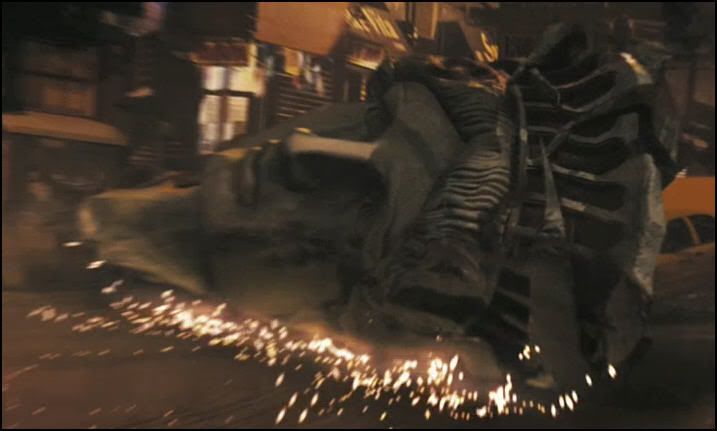
Normally, I wouldn't link to a trailer, but this trailer for an, as yet, untitled movie by J.J. Abrams (of Lost fame) is especially cool. Apparently it's for an upcoming giant monster movie.
Of course, there's no way to know whether the movie will be good or bad but I think that if it retains the POV attribute of the trailer, it'll certainly be an interesting variation of the genre.
The Fermi Paradox: The Dangerous Neighbors Hypothesis
 The Dangerous Neighbors Hypothesis suggests that intelligence may be common but that communicative intelligence is rare. The reason for this is that those species that do communicate their presence tend to be obliterated by their neighbors, leaving only those species that maintain a strict cosmic silence alive. Charles Pellegrino, in particular, has come up with "The Three Laws of Alien Behavior", which he contends apply to all species:
The Dangerous Neighbors Hypothesis suggests that intelligence may be common but that communicative intelligence is rare. The reason for this is that those species that do communicate their presence tend to be obliterated by their neighbors, leaving only those species that maintain a strict cosmic silence alive. Charles Pellegrino, in particular, has come up with "The Three Laws of Alien Behavior", which he contends apply to all species:
- Their survival will be more important than our own survival. If an alien species has to choose between us and them, they won't choose us. It is difficult to imagine a contrary case; species don't survive by being self-sacrificing.
- Wimps don't become top dogs. No species makes it to the top by being passive. The species in charge of any given planet will be intelligent, alert, aggressive, and ruthless when necessary.
- They will assume that the first two laws apply to us.
The rationale is that, in recognizing that other species represent a potential threat, and given that the survival of one's own species is of primary important, the most rational thing to do when encountering another species is to destroy them before their potential threat is transformed into a real threat. In the meanwhile, because you can assume that other species will do the same to you, your best option is to remain absolutely inconspicuous (e.g., no open radio broadcasts).
 There are two major objections to the DNH. The first is to argue that it is presumptuous to simply assume that all other species will be automatically aggressive to the point of acting with paranoid abandon. Supporters of the DNH note that even if we do presume that some species are altruistic, such species will still be in jeopardy from species that embrace the rationale of the DNH. Over time, a sort of cosmic natural selection would weed out the altruistic species leaving a galaxy full of dangerous neighbors.
There are two major objections to the DNH. The first is to argue that it is presumptuous to simply assume that all other species will be automatically aggressive to the point of acting with paranoid abandon. Supporters of the DNH note that even if we do presume that some species are altruistic, such species will still be in jeopardy from species that embrace the rationale of the DNH. Over time, a sort of cosmic natural selection would weed out the altruistic species leaving a galaxy full of dangerous neighbors.The second objection is to question the technological feasibility of destroying another species in a first strike, particularly without opening oneself to a counterstrike. Unfortunately, this is a very technical topic and it would be impossible for me to give a fair representation to the points and counterpoints that have been made over this contention. Suffice it to say that both sides do have arguments for their respective positions.
As a final note, the DNH is, perhaps, the only solution to the Fermi Paradox that directly impacts upon our own survival as a species. If the DNH is true, our radio broadcasts are placing us in grave danger and should be curtailed as soon as possible.
Labels: fermi paradox
Monday, September 17, 2007
The Fermi Paradox: The First Come, First Serve Hypothesis
 The FCFSH is a variation of the Cosmic Isolation Hypothesis that does not rely on the proposition that intelligence is intrinsically rare. The FCFSH uses the Weak Anthropic Principle in an attempt to demonstrate that if you are an intelligent species then you should expect to find that you are the first intelligent species to arise in your home galaxy. The reasoning behind the FCFSH is thus: even if a species disperses through its galaxy at a mere 1% the speed of light, the amount of time that it would take such a star-faring species to colonize every star in an average galaxy (e.g., our own) would be a mere 10 million years. While 10 million years seems like an extremely long period of time compared to our own history, it's an eye-blink in terms of evolutionary time. The FCFSH further hypothesizes that such widespread colonization would tend to preclude the development of additional intelligence. Therefore, the only intelligence likely to develop within a galaxy will be the one that first develops within a galaxy. Ergo, if you are an intelligent species, you are automatically going to be the first.
The FCFSH is a variation of the Cosmic Isolation Hypothesis that does not rely on the proposition that intelligence is intrinsically rare. The FCFSH uses the Weak Anthropic Principle in an attempt to demonstrate that if you are an intelligent species then you should expect to find that you are the first intelligent species to arise in your home galaxy. The reasoning behind the FCFSH is thus: even if a species disperses through its galaxy at a mere 1% the speed of light, the amount of time that it would take such a star-faring species to colonize every star in an average galaxy (e.g., our own) would be a mere 10 million years. While 10 million years seems like an extremely long period of time compared to our own history, it's an eye-blink in terms of evolutionary time. The FCFSH further hypothesizes that such widespread colonization would tend to preclude the development of additional intelligence. Therefore, the only intelligence likely to develop within a galaxy will be the one that first develops within a galaxy. Ergo, if you are an intelligent species, you are automatically going to be the first.
Critics of the FCFSH complain that it makes a number of hidden assumptions, the most prominent being the supposition that existing intelligences automatically preclude the development of new intelligent species. It also supposes that interstellar colonization is the de facto behavior of intelligent species (see the Stay at Home Hypotheses). Supporters of the FCFSH suggest that these criticisms violate the Copernican Principle which states that, unless we have empirical evidence to suggest otherwise, we should always assume that there is nothing unique about our status in the universe (e.g., we aren't at the center).
One bit of data that may support the FCFSH is the recent observations that our Solar System is probably among the first generation of systems that have enough complex elements (e.g., carbon) to support life. If intelligence is something that evolution has difficulty producing, we may well be among the first intelligences in our galaxy, if not the first.
Labels: fermi paradox
The Courage of Pink
 If ever they create a civilian medal of valor, these two boys need to among the first set of recipients.
If ever they create a civilian medal of valor, these two boys need to among the first set of recipients.
The story, in a nutshell, is that a new student at their school came to school wearing a pink shirt. Predictably, a bunch of bullies set upon the poor boy and tormented him with the usual sort of name calling.
David Shepherd and Travis Price witnessed this and decided that enough was enough. They went out and bought a ton of pink shirts and passed them around, making especial sure that the bullied kid had one too, and then wore them as a sign of solidarity.
It's gratifying to know that it this stunt really pissed off the bullies. One was seen throwing chairs in the cafeteria, out of frustration, and another approached David and angrily asked him if didn't know that wearing pink was a sign of homosexuality. To David's vast credit, he told the bully that he really didn't care whether or not it was.
It takes courage to stand up for your convictions. I honestly don't know if I would have been able to do the same if I had been in their shoes (and, frankly, suspect that I would have fallen short), but their example certainly inspires me to try harder to speak out the next time I witness a wrong.
Sunday, September 16, 2007
Administrivia: Link Pops
Last month I had a poll asking where or not you preferred to have links open in a new window or whether you'd prefer to have them in the same window. In addition to voting, a few of you raised arguments from either side.
On the one hand, opening a link in the same window is disadvantageous to those with low bandwidth. On the other hand, most browsers allow you to choose whether or not you want to open a link in the same window (e.g., by right clicking) while forcing a new window removes that option.
I've given the subject much thought and have decided on something of a compromise. Text links will default to opening in the current window, however, when a graphic image links to the same content as a text link on the page, I will have that default to popping open a new window.
For the vast majority of entries, the main graphic will be linked to the main content of the post so this should make it easier on those who have limited bandwidth without inconveniencing those who have bandwidth and hate to have links force them into new windows and/or tabs.
Labels: administrivia
How Geek Are You?
86% Geek
As someone who grew up in the Silicon Valley (or near enough not to make a difference), I'm constantly surprised to find that people in the wider world seem to think that being a geek isn't something to be desired. This is especially true of women.
I have a couple of female co-workers who have sworn to me, up and down, that they aren't geeks. These are women who are intimately familiar with Hitchhikers Guide to the Galaxy and will laugh out loud at jokes involving the number 42. These are women who have firm opinions about which Spiderman movie was the best. These are women who, for God's sake, know what a Ferengi is! But the stigma of geekery is such that they absolutely insisted that they weren't geeks (even the one that used to, literally, be a rocket engineer).
Finally I was able to manage to convince them to embrace their geek natures by having them take The Geek Quiz because there's nothing as authoritative as some random internet test.
Labels: geek, Personality Test, Quiz
Saturday, September 15, 2007
The Fermi Paradox: The Cosmic Quarantine Hypothesis
 The Cosmic Quarantine Hypothesis resembles, in many ways, the notion of the Prime Directive as found in the Star Trek series of science fiction shows. The hypothesis proposes that advanced species with interstellar capacity may well be common but that they are deliberately shielding their existence from us for one reason or another, e.g. to protect our cultural development. Many variants of the CQH add the additional hypothesis that we will be granted access to the galactic community once we obtain a sufficient level of development.
The Cosmic Quarantine Hypothesis resembles, in many ways, the notion of the Prime Directive as found in the Star Trek series of science fiction shows. The hypothesis proposes that advanced species with interstellar capacity may well be common but that they are deliberately shielding their existence from us for one reason or another, e.g. to protect our cultural development. Many variants of the CQH add the additional hypothesis that we will be granted access to the galactic community once we obtain a sufficient level of development.
Many people find the CQH to be an example of paranoid thinking in as much as it indicates a conspiracy of silence by vast powers beyond our reckoning. They note that not only would there have to be a quarantine against visits to our world, but that there would have to be a perfectly enforced quarantine on radio communications and other detectable manifestations of extraterrestrial intelligences, including ones from species near our own level of development. Supporters of the CQH tend to reply that such a "conspiracy of silence" would represent no more effort than setting up a duck blind for a sufficiently advanced species or set of species.
Labels: fermi paradox
Friday, September 14, 2007
DM of the Rings
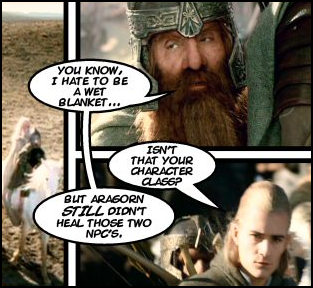 Back in the days when I was an active roleplayer, every so often one of us would have the brilliant (brilliant, I say!) idea of keeping a journal of our games so that we could then write up our adventures and, presto!, have an instant fantasy story.
Back in the days when I was an active roleplayer, every so often one of us would have the brilliant (brilliant, I say!) idea of keeping a journal of our games so that we could then write up our adventures and, presto!, have an instant fantasy story.
It turns out that this never worked out well in practice. As fun as the games were, translating them into fiction never quite panned out. Years later I realized that the problem wasn't that our campaigns were lame, it was that the media were too different.
Even though fantasy role playing borrows from the same settings as fantasy fiction, the types of narratives they generate are very different from one another.
The DM of the Rings is a humorous, yet perceptive, examination of this phenomenon in the form of a web comic that asks what would the Lord of the Rings have been like if they had been done as a fantasy RPG campaign. It is often achingly funny while, at the same time, serving as a good study of roleplaying as well as storytelling.
Be sure to read the author's comments at the bottom of the strips.
Labels: geek, Lord of the Rings, Narrative, roleplaying, Web comic
Thursday, September 13, 2007
Nature, Black and White in Tooth and Claw
 A very cool collection of black and white nature photographs by Nick Brandt.
A very cool collection of black and white nature photographs by Nick Brandt.
Labels: beautiful, Nature, photography
The Fermi Paradox: The Cosmic Isolation Hypothesis
Perhaps the simplest solution to the problem of why we seem to be alone is to suggest that this is because we are, in fact, alone. This hypothesis proposes that life (or, at least, intelligent, communicative life) is extremely rare and that the density of intelligence in the universe is so low that we should never expect to find anyone else out there. One pertinent argument against this hypothesis is the observation that life got an extremely early start on Earth. Practically as early as life could have started, it did. This would suggest that life needs minimally favorable conditions in order to start and to thrive. The upshot of this argument is that we should expect life and, hence, intelligence to be very common and not the product of a Great Accident.
One pertinent argument against this hypothesis is the observation that life got an extremely early start on Earth. Practically as early as life could have started, it did. This would suggest that life needs minimally favorable conditions in order to start and to thrive. The upshot of this argument is that we should expect life and, hence, intelligence to be very common and not the product of a Great Accident.
However, proponents of the CIH note that, although life on Earth got a very early start, it took four and a half billion years to produce sapience. Furthermore, if it weren't for a number of bona fide accidents (including the extinction of the dinosaurs) the Earth would probably still be barren of intelligence. This would suggest that intelligence is something that natural selection doesn't produce easily and that it may, in fact, constitute such a rare accident as to drive down the density of intelligent life to the point where the Fermi Paradox would be satisfied.
It should be noted that "low density" is a relative term. If the density of intelligent life is so low that there is only an average of one intelligence in ten galaxies, there are good reasons to believe that we would always be out of the communication range of fellow intelligences even though the observable universe would contain approximately one hundred million sapient species in it.
Labels: fermi paradox
Wednesday, September 12, 2007
Geek Tattoos

Given the number of tattoo links I post, I wouldn't be surprised if you thought that I was a human mural. The fact of the matter, however, is that as much as I like the idea of getting a few tattoos, I don't have nearly enough confidence in my ability to choose something that I'd still be happy with five years from now to risk it.
Be that as it may, here's a nice collection of some very geeky tattoos.
Tuesday, September 11, 2007
The Fermi Paradox: The Chariots of the Gods Hypothesis
 Similar to the Aliens are Among us Hypothesis, the Chariots of the Gods hypothesis is that aliens aren't currently here, but that they were here at some point in the past. The COTGH suggests that evidence of this can be found in the mythologies of the world and in the help that they lent to ancient cultures in building large and complex structures, such as the pyramids.
Similar to the Aliens are Among us Hypothesis, the Chariots of the Gods hypothesis is that aliens aren't currently here, but that they were here at some point in the past. The COTGH suggests that evidence of this can be found in the mythologies of the world and in the help that they lent to ancient cultures in building large and complex structures, such as the pyramids.
Critics of the COTGH complain that mythological "evidence" isn't empirical evidence and that the structures the proponents of the theory point to could have been built by so-called primitive cultures. They further suggest that, had aliens visited us in the past, we should expect to have found some bona fide artifacts by now. Supporters of the COTGH respond that, even among human cultures, only a fraction of the artifacts of our cultures survive even a few thousand years and that, if the aliens were only here a comparatively short time, we shouldn't necessarily expect to find physical evidence. They further note that mythology can provide real evidence of historical occurrences, as the myth of the fall of Troy has demonstrated.
Labels: fermi paradox
Monday, September 10, 2007
Unstructured Street Art

I am a big fan of street installations, which are a kind of guerrilla art where the artists place sculptures in an environment with the goal of amusing, confusing and or provoking onlookers.
Here's a collection of some particularly good ones.
Labels: art, Cool, street installations
The Fermi Paradox: The Apocalyptic Hypothesis
 One of the more ambiguous parameters of the Drake Equation is fL, which is the fraction of the duration of a planet's existence during which communicating civilizations exist. In other words, this is the average "life span" for an intelligent species. If fL is a low number, this would indicate that most intelligent species have a very short period of existence and that, consequently, the average density of intelligent life for any given period of time would be low enough to satisfy the Fermi Paradox. One possible mechanism that would promote this would be the development of self-destructive technologies. Our own species appears to be passing through a period of its development where there are any number of ways that we could bring about our own destruction, including nuclear holocaust, environmental collapse, biological warfare, and so forth. Nor does the future appear to be getting any safer as is seems that such "horizon technologies" as nanotechnology will offer us even more paths towards self-destruction that are even easier to take.
One of the more ambiguous parameters of the Drake Equation is fL, which is the fraction of the duration of a planet's existence during which communicating civilizations exist. In other words, this is the average "life span" for an intelligent species. If fL is a low number, this would indicate that most intelligent species have a very short period of existence and that, consequently, the average density of intelligent life for any given period of time would be low enough to satisfy the Fermi Paradox. One possible mechanism that would promote this would be the development of self-destructive technologies. Our own species appears to be passing through a period of its development where there are any number of ways that we could bring about our own destruction, including nuclear holocaust, environmental collapse, biological warfare, and so forth. Nor does the future appear to be getting any safer as is seems that such "horizon technologies" as nanotechnology will offer us even more paths towards self-destruction that are even easier to take. Critics of the AH argue that it is an extremely pessimistic premise and that there is no good reason to suppose that "technological adolescence" has a particularly high mortality rate. They note that we seem to have cleared many of the hurdles that have faced us and that, for the time being, it would even seem that we are moving away from the brink of disaster. Proponents of the AH agree that it is a pessimistic hypothesis but point out that this does not dismiss its potential viability. That note that, unless we have cause to believe that other species are wiser than us, a dangerous period of technological adolescence seems to be practically unavoidable, particularly given that there seems no end in sight of the deadly hurdles that a species must clear.
Critics of the AH argue that it is an extremely pessimistic premise and that there is no good reason to suppose that "technological adolescence" has a particularly high mortality rate. They note that we seem to have cleared many of the hurdles that have faced us and that, for the time being, it would even seem that we are moving away from the brink of disaster. Proponents of the AH agree that it is a pessimistic hypothesis but point out that this does not dismiss its potential viability. That note that, unless we have cause to believe that other species are wiser than us, a dangerous period of technological adolescence seems to be practically unavoidable, particularly given that there seems no end in sight of the deadly hurdles that a species must clear.
Labels: fermi paradox
Sunday, September 09, 2007
The Fermi Paradox: The Aliens are Among Us Hypothesis
 One potential answer to the question of "Where are they?" is "Right here!"
One potential answer to the question of "Where are they?" is "Right here!"
The AAAUH hypothesis suggests that, contrary to the opinions of skeptics, aliens are visiting the Earth and that they are being detected, albeit not in ways that the orthodox scientific community is willing to accept. Supporters of this hypothesis point to the large number of reported sightings and close encounters of various types.
Detractors of this hypothesis note that, in spite of the large number of sightings, no empirical evidence has been forthcoming. More so, attempts to account for this lack of empirical evidence often tend to cross the threshold into the realm of outright paranoia (e.g., in contending that the governments of the world are deliberately suppressing information). Proponents tend to dismiss such accusations as being either myopic or deliberately obtuse.
Labels: fermi paradox
Saturday, September 08, 2007
The Fermi Pardox: Introduction
Before Unstructured Musings, I had a website called The Lair o' Lias. One of the sections of the site was dedicated to the Fermi Paradox. Thanks to the Wayback Machine, from the Internet Archive, I've been able to salvage the content of it. I thought it would be a good idea to post it to the blog. I'm breaking it into sections starting with this, the introduction.
Are we alone in the universe?
This is one of the greatest mysteries of our age. Clearly our intuition suggests that we aren't alone. It's hard to look up at the sky and to contemplate those hundreds of billions of stars in our galaxy alone without thinking that there simply must be intelligent life out there somewhere — probably life that we could communicate with if we only knew where to look and how to listen. Certainly this has been one of the great themes in Science Fiction. Over the last century, ever since H.G. Wells wrote The War of the Worlds, our media has been flooded with speculative stories that reflect our hopes (and fears) for the existence of alien life.Venus
 In 1961 the noted astronomer Dr. Frank Drake came up with an equation, later to be known as the Drake Equation, which set definite parameters on how many extraterrestrial civilizations should exist. The Drake Equation asks several questions:
In 1961 the noted astronomer Dr. Frank Drake came up with an equation, later to be known as the Drake Equation, which set definite parameters on how many extraterrestrial civilizations should exist. The Drake Equation asks several questions:- How many stars are there in the galaxy?
- What fraction of those stars have planets around them?
- What fraction of those planets are capable of sustaining life?
- What fraction of those planets actually have life?
- What fraction of that number have intelligent life?
- What fraction of intelligent life forms are able and willing to communicate?
- How long do such intelligent, communicating species live (on the average)?
The beauty of the Drake Equation is that if you plug in numbers to all of its variable, you get a good estimate of how many intelligent, communicative species should exist in the galaxy at any one time. Unfortunately, this is easier said than done. Some variables, such as the number of stars in the galaxy, are easy to come by. Some, such as the number of stars with planets, can be only be approximated from educated guesses. Some, such as the fraction of biospheres that develop intelligence, are the subject of raw speculation. In spite of this, the Drake Equation generated a great deal of hope in those who wanted to believe in the existence of extraterrestrial intelligences for the simple reason that all but the most pessimistic estimates indicated a galaxy that was absolutely teeming with vocal ETIs.
SETI, the Search for Extraterrestrial Intelligence, was founded on the basis of that optimism. If you had asked the attendees at the first SETI conference to guess how long it would take before we discovered a signal, I'm confident that most would have guessed that we would do so within the space of a few years. I'm equally confident that none would have dared suggest that we would never find such evidence. Forty years later, we find ourselves confronted with a lingering silence, punctuated by several false or unconfirmable signals, and a muted sense of optimism. Most people still believe that we will find other intelligences, but there is the deep question of why, if life is as common as we suspect it is, we haven't found it yet.
 The great physicist Enrico Fermi was one of the first people to ask this. Certainly he was the one who put it most succinctly: "Where are they?"
The great physicist Enrico Fermi was one of the first people to ask this. Certainly he was the one who put it most succinctly: "Where are they?"More formally, if intelligent life is as common as the Drake Equation tends to lead us to believe, why isn't its existence so obvious as to be unmistakable? Indeed, why isn't it already here?
This is the Fermi Paradox: If extraterrestrial intelligence is as common as we believe it should be, its presence should be obvious and unmistakable. It isn't. Hence the paradox.
It is a question that bestrides the question of our place in the universe. Where are they? There is a certain temptation to resist asking it, to dismiss it as premature and unworthy of consideration.
And yet… and yet…
Its presence casts a pall over any discussion of alien life. As much as we want to ignore it, as much as it acts as a damper to our enthusiasm, we are compelled to address it. It is a question that many people have contemplated, and it is one that has generated numerous potential answers.
Labels: fermi paradox
Friday, September 07, 2007
Unstructured Dazzle
Light art, created by long exposures and a bright, moving "pen", is cool enough but animating it increases the magnitude of the cool by a factor of "wow".
Thursday, September 06, 2007
Unstructured Rockin'
I love industry hyperbole. I just got an invite to a seminar that promises to turn me into a "SQL Server Rock Star". Oh yeah... it's a lifestyle filled with hookers, blow, and table indexes!
My favorite part:
Dont' miss these other rockin' sessions:I feel like Keith Richards just thinking about it. Send in the groupies.
“Disk and I/O Tuning and Optimization on SQL Server 2005”
Presented by Douglas Chrystall
Wednesday, Sept. 19, 2007 from Noon – 1 P.M.
“Performance Baselining, Benchmarking, and Monitoring”
Presented by Kevin Kline
Friday, Sept. 21, 2007 from 9:45 A.M. – 11:15 A.M.
Labels: Hyperbole, Information Technology, Rock Star, SQL Server
Unstructured Drawings

Here is an absolutely fascinating experiment where artists took kid drawings and then reworked them while adhering to the basic design.
Wednesday, September 05, 2007
Fisher Man

We found him at the bottom of the lake,
Neither dead nor drowning,
Covered in muck and moss,
Communing with the carp
And the catfish.
We offered,
By signs and gestures,
To haul him up and out,
To dry him off,
To find some warm place
Where he could stand
And breath.
He inclined his head
To deline our offer,
Smiling as minnows
Darted between the gaps
In his teeth.
Photo courtesy of "alarch"
Tuesday, September 04, 2007
Unstructured "What the...?"

I'm really not sure what, exactly, this is except that it's a frentic video with lots of weird cat-things set to a high-speed techno mix.
Um... enjoy?
Monday, September 03, 2007
The State of the Blog

There were a grand total of sixty-nine new posts last month. To understand why this is a significant fact, consider that there were only sixty-four posts in the entire year of 2006. To be sure, 2006 was the least productive year for Unstructured Musings but even the best year, 2005, only have a total of one hundred and forty-seven posts. The reason for this proliferation of posts is that I've made some deep changes in the methodology and philosophy behind the blog.
Before I explain the changes that I've made, and the reasons behind them, I'd like to explain a bit about how I make content. There are two major categories of blog content: derived and original.
Derived content, as the name implies, is content which is derived from other sources. In the simplest case, it's simply a post pointing to some other content with a short blurb attached to it ("Check out this site!"). The advantage of derived content is that it's fairly easy to produce.
The problem with derived content, however, is that there's always the possibility that you'll have already seen it. Any day you come here and there's nothing interesting for you to see is a reason for you not to come back, so any time I put up something you've found on your own, there is the potential that I've driving you away. In order to minimize that possibility, I need to go out of my way to find content that you probably haven't seen before, which means, among other things, that I need to avoid so-called viral content (which is content that rapidly spreads by way of word of mouth). So things like the Dramatic Chipmunk videos are something I need to avoid. This is something of a paradox, though, because viral content is viral precisely because people like it, which means that I'm deliberately avoiding the very things that are most interesting on the web, which means that I need to expend some thought and effort in order to find things that I think you'd enjoy.
One thing that I can do so increase your interest in derived content is by trying to add value to it. A good example of this is something I call a mosaic post which is a post where I tie together several different pointers with a theme. The recent Elven Tattoo post is a good example of that since it has links to cool Elven tattoos, another link to how to translate your name into Elven, a third link to how to write in Elven, a link to some software (along with a font link), a link discussing dialects of Elven, and finally a link to an Elven wedding invitation. This method provides you a kind of one-stop shop for cool content. Unfortunately, mosaic posts have their own drawback which is that they take me a fair amount of time and energy to put together which goes a long way towards negating the main reason to post derived content.
Original content is just that: content that I create, more or less, from scratch. Although it is possible to create a blog with such a niche theme, using derived content, that it's stands apart, most blogs (including this one) rely on original content to distinguish themselves from other blogs. Original content can take many forms from simple journal posts and poems all the way up to full blown essays and stories. Naturally, the longer and more complex the original content, the more effort it takes to create it.
When I created Unstructured Musings, blogs were just starting to go mainstream. As a consequence, I really didn't have a good template for what a blog should be. Most of the blogs at that time were basically online diaries. An online diary can be interesting is the author has a sufficiently interesting life. If I spent my days travelling to exotic locales, or if I had just won the lottery, it's entirely possible that people would be interested in knowing what was going on with my life on a day to day basis. The majority of people, however, live lives that are really only interesting to them and their inner circle of friends and family. Given that my days mostly revolve around work and reading, I knew that this wasn't what I wanted my blog to be about. I decided that the primary focus of the blog was going to be essays. My goal was to write an essay a week on any topic that I desired (hence the "unstructured" part of Unstructured Musings).
My frame of reference, at the time, took the form of traditional web pages. The big difference between a blog and a web page is that the latter is much more static. A personal page can go for months, or even years, without updates or new content and that's just fine. A blog, however, is dynamic and temporal. Although I had some sense of that, I didn't really appreciate how important it was to regularly post new content.
Within a few months (May, to be exact), I realized that weekly updates weren't cutting it so I went to an ironically structured format where I'd post new content three times a week: an essay every Sunday, a poem every Thursday, and a "fun" link every Tuesday, which means that I had committed to a structure where 2/3rds of all my content was original and that half the original content took a very long and involved form.
Just writing the essays proved to be grueling. An average essay runs about 2,000 words and the majority of them required a fair amount of research on top of the original thought that went into them. Add to that the fact that I was also producing original poetry every single week and that I had to dig up a fun and interesting link in my spare time (to say nothing of all the background administration that goes into running a blog). What started out as a labor of love swiftly became a chore. The miraculous thing is that I kept up that pace, unabated, for more than a year.
By mid-2005, however, signs of strain were beginning to show up. I started missing my essay deadlines. In order to compensate for this, I switched to a bi-weekly essay format where every other work would be an off-site essay. Even this wasn't enough to eliminate the stress of producing the blog. By the end of 2005, I was writing essays that I weren't able to finish (which was utterly unfair to you, my readership).
2006 was the year that nearly broke the blog. A series of health and personal issues drained me of a significant fraction of my energy. The amount of original content dropped to nearly zero and even the derived content only came out as a trickle. By 2007 I was seriously considering shutting the whole thing down. This urge was compounded by Blogger going to a new style sheet format. Although it was possible to me to continue using the existing style sheets, if I wanted to make any changes, what so ever, to the formatting of the blog, I would need to convert it, which meant redesigning the style sheets from scratch.
June was Unstructured Musings' Rubicon. For the first time ever, I didn't post anything at all. I spent the entire month wondering if I should just pull the plug. On the one hand, there really is something I love about Unstructured Musings. Even though my readership is small, the quality of the commentary I've gotten from you has been amazing. There is also the fact that it's a creative outlet, for me, which is something I do need in my life. On the other hand, if blogging caused me more grief than happiness (especially in the form of guilt when go a long time without posting), perhaps it would be better to give it a quiet burial.
So I sat down and thought about it. And thought about it. And thought about it some more. Ultimately, I decided that I would like to keep the blog alive but that that I would need to change the way that I'm managing it, and whether I still wanted to.
I decided that the first decision was going to be whether or not to update the style sheet. If the blog was going to continue, I didn't want to keep clinging to the old sheet. Conversely, if I didn't think that it was worth redoing, then it wasn't worth continuing. Obviously, I did decide that it was worth it. The new look went live on July 25th. This was a reboot both symbolic and literal.
The first, and biggest, change to the blog, beyond the cosmetics of the new style, is the way that I produce content. I've created a folder in my bookmarks called "Blog Fodder". Whenever I come across a link that seems cool, I bookmark it into that folder. Every so often, I'll take a chunk of the links I've bookmarked and then write up posts that link to them, saving those posts to draft, in Blogger (which means that they don't show up on the public page). This means that on any given day, I can just change the status of one of the queued posts from "draft" to "final" and I have a fresh post.
This has two benefits: 1) I have the ability to create fresh content on a daily basis and 2) if I'm not in the mood to work on the blog on a given day or week, I don't really have to beyond the minimal effort of getting something out of the draft bin. This also means that on those days when I do feel like blogging, I can put a whole bunch of things into the queue all at once to use in the future.
Naturally, this means that there's been a shift in content away from original and towards derived content. That doesn't mean, however, that there won't be any more original content; however, even there the focus is going to shift away from essays and towards shorter forms such as reviews, poems, and things like the archetype posts. I will still write essays and stories but those are going to be published on the order of several times a year instead of several times a month. Not only will that be considerably less exhausting for me but I think that it will result in a higher quality of essay, which will be good for you.
August was a deliberate experiment to see what sort of pace I could set for content generation. On average, I put up about 2 ¼ new posts a day. I was glad to discover that I could keep up that pace without exhausting myself. That said, I don't think you'll be seeing that many posts in a month again. Even though I didn't feel myself burning out in August, I could sense that I was pushing the limit. I would like to give myself more of a buffer so I'll be throttling back. Most days, I'll be limiting myself to a single post and, most of the time, that post will be something that's derived. I will try to have an original item on average of once a week but that item will usually take a short or medium form (i.e., under 500 words).
Change is always risky. Most of my regulars have stuck with me for some time and, judging by the poll I did on the subject, the thing you like most about the blog is when I do long and complicated posts such as essays and stories. I realize that by moving the emphasis away from those kinds of things, I risk losing your interest. Unfortunately, I just can't produce that type of content a frequent basis without destroying my own love for this place, which is also something I don't want to do. It is my sincere hope that the change in direction won't be too jarring and that I will be able to make it worth the while for you to keep me in your bookmarks.
Labels: blogging, Essay, State of the Blog, Unstructured Musings
Sunday, September 02, 2007
Unstructured Positions
 Although Summer doesn't officially end until September 21st, most people in the U.S. consider Labor Day Weekend to be Summer's last hurrah. With that in mind, here's a list of five summer sex positions that might very well send you to the emergency room if you try them (along with sarcastic commentary).
Although Summer doesn't officially end until September 21st, most people in the U.S. consider Labor Day Weekend to be Summer's last hurrah. With that in mind, here's a list of five summer sex positions that might very well send you to the emergency room if you try them (along with sarcastic commentary).
I should hope that it would go without saying that clicking on the link will bring up some very unsafe for work graphics (although nothing that I would consider too graphic, if you know what I mean). Please use some common sense; I'd hate to responsible for anyone getting in trouble with their employer.
Labels: Humor, Sex, Sex Positions, Snark
The Museum of Hoaxes
 To me, hoaxes represent a fascinating glimpse of how creativity and credulity can intersect. A good hoax is part joke, part lie, and part tale. Some of them, of course, are simply malicious: attempts to con the gullible out of money and property. The best ones, however, are a kind of absurdist art form: a dadaism of the soul.
To me, hoaxes represent a fascinating glimpse of how creativity and credulity can intersect. A good hoax is part joke, part lie, and part tale. Some of them, of course, are simply malicious: attempts to con the gullible out of money and property. The best ones, however, are a kind of absurdist art form: a dadaism of the soul.
The Museum of Hoaxes is a repository of hoaxology and, as with all good museums, visitors are encouraged to wander between the exhibits at will.
There is a collection of famous historical hoaxes, another collection dedicated to ingenious April fool's jokes, a third that focuses on collegiate pranks, an encyclopedia of hoaxes, a photographic exhibit, and many others besides.
Saturday, September 01, 2007
This Explains a Lot
One of the features of Netflix is that it tells you what other movies were enjoyed by the people who enjoyed a given movie.
I think that the following extract goes a long way towards accounting for the persistence of awful movies.
Superbabies: Baby Geniuses 2
Shark Tale
Batman & Robin
Garfield: The Movie
Scooby-Doo 2: Monsters Unleashed
Catwoman
Labels: Bad Movies, movie, Netflix
(Really) Unstructured Sentence
I trust that you've already seen the video of that poor Miss Teen USA contestant from South Carolina who floundered her way through a flummoxed monological thicket when asked her thoughts on why Americans can't seem to find the U.S. on a map. Here is Jimmy Kimmel's explanation of what she was trying to say.
Labels: funny, language, Miss Teen USA, Sentence
